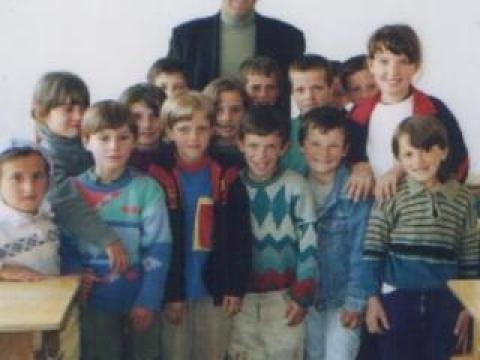Before we start preaching peace to others

Comprising both Albanian and Macedonia nationalities, the World Vision team has been traveling to remote villages to rehabilitate schools, often spending 2.5 hours on the road each way. “I would estimate an approximate of a thousand kilometers we were making each week”, says Slobodan Ignatovski, the Chief Engineer on the project. “It was at times tiring, but I am glad the good work of World Vision is now to be found in the remotest places of Macedonia.” His Albanian colleague Xhemal, who is coming from Tetovo, one of the epicenters of the spring 2001’ inter-ethnic conflict, names these travels a highlight of his time with World Vision. “I’ve got to see other parts of the country that I could not even think of getting to on my own; not to ethnic Macedonian areas with my Tetovo license plates, anyway. Now, I have seen the way other rural communities live and work, and welcome us too.”
Now, two years after the conflict, the emergency phase is clearly over and international agencies with a relief mandate are leaving the country. With the completion of its School Rehabilitation Programme lasting for over 2 years, World Vision is leaving Macedonia as well. Twelve village schools have been brought back to life as a result of World Vision’s ministry providing about 1500 children with safe and decent conditions to continue their studies. Yet the effect of the schools rehabilitation work goes beyond much needed technical assistance to communities; it contributes to Macedonia’s long-term objectives – reconciliation and peace-building. A legacy that World Vision is leaving with local communities is an example that peaceful and successful work together is indeed possible.
Kujtesa, a Kosovo-born Albanian student of water engineering, was involved in the community work in the villages. “A school in a village”, she shares, “is more than we who live in towns are used to think of it. A rural school is a center of social and cultural life, for both children and adults. When the school is rehabilitated the whole community around it benefits.“ Together with Rusana Janeva, her Macedonian associate, Kujtesa has learned that patience and understanding are key to building trust between the WV staff and the communities. The longest-standing staff of WV Macedonia, Rusana has been sharing from her talent of communicator and relationship-builder as she participated in numerous rural needs assessments trips, situation follow-up, inter-agency meetings and community events.
The School Rehabilitation project has offered a benefit of new experience and knowledge that all staff can now carry into their future. Apart from personal and professional learnings, each of them will remember their time with World Vision for its team spirit surpassing any background differences. In the words of Rusana, “We are all very diverse on our team, but we seem to be getting along very well.”
As a team, they have set an example of ethnic differences becoming an advantage rather than an impediment to communication and work. Between 4 of them the staff shared 5 languages, enough to make a conversation with most ethnicities in Macedonia, and make communities feel listened to and recognized.
Alongside peace-building rhetoric these are small practical steps that pave the way to restoration of trust. While the Brotherhood and Unity slogan has lost its credit, or so it seems, these are positive life examples that people still believe.
And World Vision has managed to set at least one such example.
For more information please contact World Vision Macedonia Program Manager Julian Srodecki at julian_srodecki@wvi.org or +389 70 358 338.